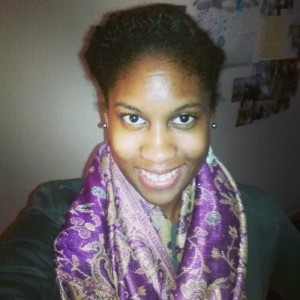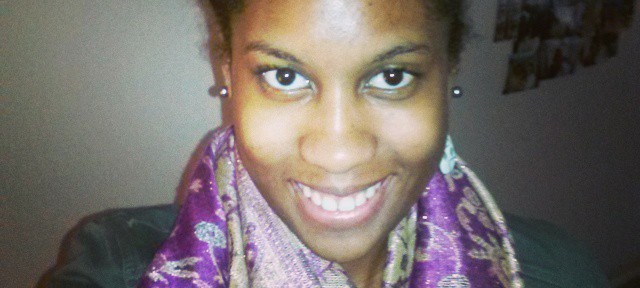
Bianca Poindexter
Guest columnist: Bianca Poindexter, Northeastern University, Class of 2015
What social identities do you currently identify as most central to you? I identify as Black, Queer, Cis-Woman, Able-Bodied, 24, and Christian
If you could go back in time, what advice related to your intersecting identities would you give to your former self upon applying for and entering graduate school? The advice that I would give my former self when applying for graduate schools would have been to think even bigger and go even further out of my comfort zone. I would have also said to search for programs that had more people with intersecting identities, including both the students and the professors; to expand my horizons. I would have explained to that young woman entering graduate school to not be so anxious, intimidated, and not feel so unworthy of where she was; that she deserved to be there, like everybody else, and to not be ashamed of who she is.
Describe an instance where you were “forced” to choose or represent one identity over another. How did you negotiate this instance? What did you learn from this experience? I was put in the position of representing the voice of the LGBTQ population on several occasions in the classroom. I was not “forced,” but I felt that if I did not speak to the reality of some of the issues that the LGBTQ population was facing, then no one would. I felt that many people in my cohort knew very little about that population or had blinders on to those issues. Some were not understanding of the fact that those issues affect not only myself and others in the class, but also a large population of people whose voices are finally being heard, or that such issues could affect people they know who are afraid to come forward. I felt that it was my duty and obligation to make sure they understood that the LGBTQ population has a face and a name. Not everyone but some of them definitely needed to be woken up to what the reality of the situation is.
How have you found support and spaces to talk about your intersecting identities as they relate to graduate school and your quality of life? Coming into this program at Northeastern University, I was already intimidated and felt like there would be no one to express my whole self with. I somehow lucked out to meet another woman in my cohort, Amanda Weber, who I could identify with. She and I built a friendship on like interests and we could discuss our identities, as well as school together and not feel judged. I found others in the program who turned out to be very accepting, as well as my academic advisor, Dr. Tracy Robinson-Wood. It was amazing and relieving to have a group of people to vent my frustrations and my struggles to. These people helped me get through the program and understood where I was coming from on different levels. I have two friends in the program who are Black, several who are women, and one who identifies on the LGBTQ spectrum. It was exactly the group that I needed to make the graduate experience less isolating, as well as my friends and my mother back home in Georgia who had great listening ears.
This column is part of a monthly series highlighting the experiences of students and professionals with diverse intersecting identities and is sponsored by the APAGS Committee on Sexual Orientation and Gender Diversity and the Committee for the Advancement of Racial and Ethnic Diversity. Are you interested in sharing about your own navigation of intersecting identities in graduate school? We would be happy to hear from you! To learn more, please contact the chair of APAGS CSOGD (Julia Benjamin, jzbenjam@gmail.com) or CARED (James Garcia, jjg0136@gmail.com).


Since I came out as trans (2003) after grad school (1997), I find this post putting a smile on my face. Back in the 20th century transfolk were still invisible to the Psychology profession, just as intersex folk are still invisible now.
There has been so much change for the better in world society since Christine Jorgenson, Stonewall, and the addition of T to LGB. And I applaud the younger generation for continuing the struggle by building on the work of the activist-pioneers before them.